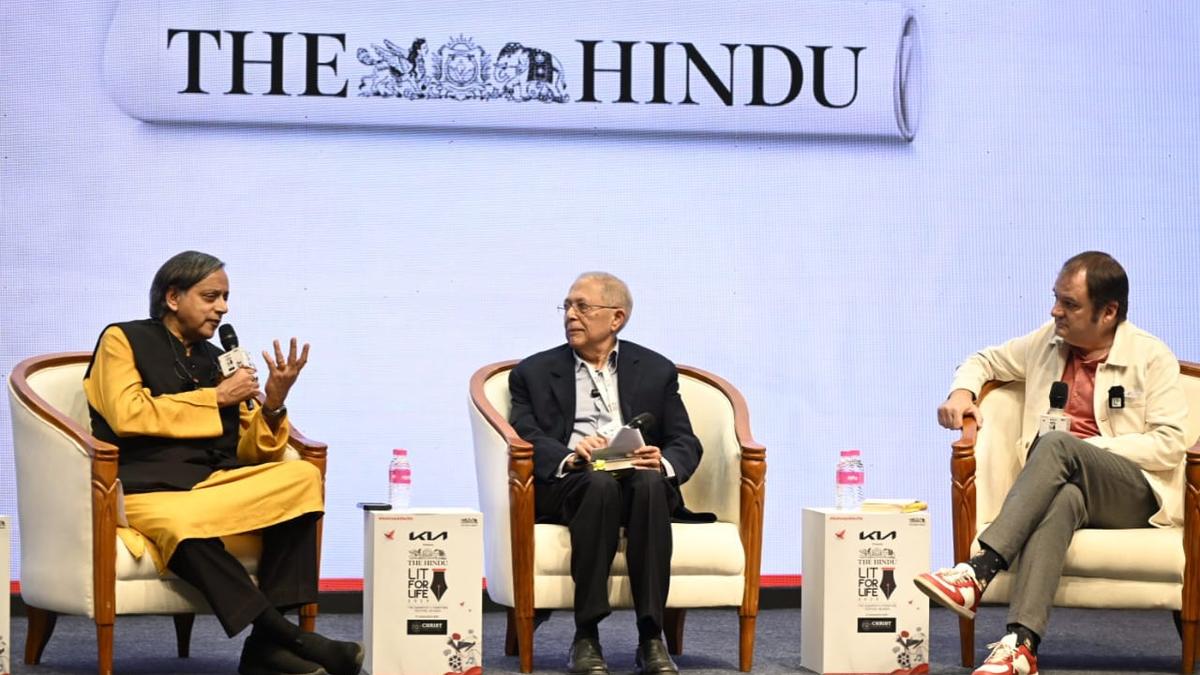
The Hindu Lit for Life 2025: Liberalism and Hinduism are totally compatible, says Shashi Tharoor
The Hindu
Shashi Tharoor discusses the compatibility of Liberalism and Hinduism, emphasizing the diverse paths and freedom within Hinduism.
Liberalism and Hinduism are totally compatible. Hinduism offers such an extraordinarily eclectic mix of choices and ways to worship and realise oneself, and doesn’t claim to be the only true religion in the world, said Shashi Tharoor, writer-politician and former Union Minister at The Hindu Lit for Life 2025 in Chennai on Sunday (January 19, 2025).
Mr. Tharoor was in conversation with N. Ravi, Director, Kasturi and Sons Limited of The Hindu Group, and Francesc Miralles, renowned author and novelist, on the topic ‘The Four Purusharthas: The Path To Happiness, Success, and a Meaningful Life’.
Explaining why he wrote a book called ‘Why I Am A Hindu’, Mr. Tharoor said the book was written at a time when “weaponisation of Hinduism for political purposes in our country had reached a particular stage.” According to him, it was necessary to offer an alternative view. “Because I was not prepared to surrender my faith to one particular narrow interpretation,” he said adding that he thought writing this book was necessary “to reclaim the idea of Hinduism” for those Hindus who wish to agree with him. “...and it turned out to be awful... [but] found some resonance amongst the new readers,” he said recalling the controversy the book evoked when it was published in 2018.
Mr. Tharoor said Hinduism is an ideal faith for the 21st century. “No one is taking a monopoly in Hinduism. Swami Vivekananda said, it is not just a religion that teaches tolerance, it teaches universal acceptance. Not only Dharma, Artha, Kama, and Moksha – the four Purusharthas – there are several paths in Hinduism. For instance, the four paths of Yoga. In Bhakti Yoga you can go to a temple and pray; in Jnana Yoga you can read and understand; in Raja Yoga you can meditate and find the truth within yourself, and in Karma Yoga you can go out and do service to humanity and reach the divine. There are multiple choices of worship and individuals have tremendous amounts of freedom.”
Responding to a question on the public support for Hindutva reflected in the last three general elections, Mr. Tharoor pointed out that the BJP got 31% of votes in 2014 elections, 37% in 2019 and 36% in 2024. “In no case, they have won a majority of the Hindu population, which is 80%. We tend to lose sight of the fact that in our first-past-the-post system, a party doesn’t actually need a majority of votes or a popular sentiment to get a majority of seats. The assumption that everyone who votes for the BJP necessarily believes in Hindutva is also not true. But there is much greater acceptance for Hindutva, particularly across northern India, than there was 10 years ago. That’s partially a reflection of the success of the BJP in politics.”
Explaining about writing a book on the four Purusharthas, Mr. Miralles said “India is the cradle of spirituality. Answers to questions like what it means to be human? And what is the meaning of life? were answered in Indian philosophies. Buddhism came from the north of India to China and later to Japan. Now it is called the Zen culture. But the origin is India. We can say the same for meditation, yoga, and so many things that are nowadays common all around the world. The roots are here. India is not only an inspiration that comes from the past, but it is an inspiration for the future too.”
Speaking about happiness Mr. Miralles said “I would define happiness in two ways. The first is simplicity. The happiest people we have met in our lives are very simple. Another one is purpose. When you discover your mission in life and have a feeling of being rich inside, that would give happiness. Detachment is not only about giving up materialistic possessions. Detachment also applies to our way of thinking.”













